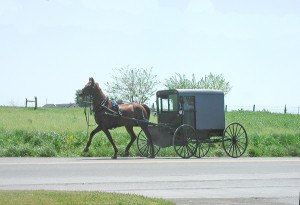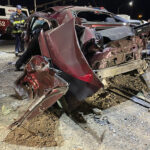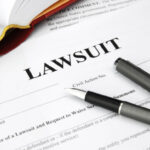Rumble strips in the driving lanes of some rural Kentucky highways aren’t intentional.
They’ve been etched into asphalt by the old-fashioned metal wheels that some Amish farmers have been putting on modern tractors.
Sen. Joey Pendleton, D-Hopkinsville, wants the damage stopped, but he’s getting little sympathy from fellow lawmakers for a bill he filed that would bar steel-wheeled tractors and farm implements from being driven on highways unless they have a strip of rubber to keep the metal from digging into the blacktop.
“It’s certainly not a slap in the face or punishment for the Amish, because I admire them,” Pendleton said. “But right’s right, and wrong’s wrong. They don’t need to be out with these big tractors and steel-wheel wagons tearing the roads up.”
The bill also would require vehicles with wooden wheels, like those used on horse-drawn buggies, to have rubber strips.
The Amish, riding a wave of goodwill among Kentucky lawmakers, have little reason to worry that Pendleton’s bill will pass the legislature. Senate Transportation Committee Chairman Ernie Harris, R-Crestwood, said he doesn’t intend to call the measure up for a vote.
“The bill as written seemed to be very broad, and we were concerned about the unintended consequences,” Harris said. “What about a parade? A lot of folks have old tractors, some of those are steel-wheeled tractors built in the ’20s and ’30s. Would they be prevented from being in a parade?”
Pendleton said that’s a weak excuse for not dealing with a troublesome issue.
Amish communities differ on their approaches to modern farm implements. Some use only horse-powered equipment, while others allow modern tractors. Yet others allow the tractors only if they have metal wheels. Local church leaders decide what is appropriate.
Todd County Judge-Executive Daryl Greenfield said his community is rural with limited financial resources, and people don’t like seeing the roads damaged needlessly.
“It’s just like those ruffles along the sides of interstates,” Greenfield said. “Basically, that’s the way some of our roads sound when you go down them. Your car vibrates.”
 Several Amish men, in their trademark broad-rimmed black hats and long beards, were in Frankfort earlier this month to meet with lawmakers on legislation intended to keep them out of jail for not displaying bright orange slow-moving vehicle triangles on their horse-drawn buggies because of religious objections. They forged strong relationships in their daylong visit.
Several Amish men, in their trademark broad-rimmed black hats and long beards, were in Frankfort earlier this month to meet with lawmakers on legislation intended to keep them out of jail for not displaying bright orange slow-moving vehicle triangles on their horse-drawn buggies because of religious objections. They forged strong relationships in their daylong visit.
“When people request relief or accommodation in areas that relate to their religious beliefs, I think that we as human beings typically want to respond because we know someday it may be any of us who is challenged in those areas,” said Sen. Ken Winters, R-Murray. “This is not just a causal thing. This is doing what’s right but is safe for everyone concerned.”
Winters and Rep. Johnny Bell, D-Glasgow, introduced separate bills that would allow the Amish to use strips of reflective white tape on the backs of their horse-drawn buggies rather than the florescent orange triangles. The House and Senate favor the legislation, which will likely be molded into a single bill before being brought up for final passage. Gov. Steve Beshear hasn’t said whether he would sign the measure into law, but he said he would review the bill carefully if it gets to his desk.
Some Amish men already have spent up to three weeks in jail for not displaying the emblems on their drab buggies.
Winters and Bell say outlining the buggies in the tape makes them shine brilliantly in the dark when they reflect car lights. But Rep. Fred Nesler, D-Mayfield, warned that the tape would do nothing to make the buggies more visible in daylight, which he fears could lead to deadly rear-end collisions on the rural stretches of highway.
The legislation, which would go into effect immediately if signed by the governor, was prompted by the recent jailing in Graves County of Amish men of the conservative Swartzentruber sect for their refusal to pay fines in traffic cases caused by their not using the signs. The defendants have appealed their convictions to the Kentucky Supreme Court on religious grounds.
Justices have set oral arguments in the case for March 15. Lawmakers could resolve the issue sooner by passing either the House or Senate bill.
Was this article valuable?
Here are more articles you may enjoy.

 Report: Vehicle Complexity, Labor ‘Reshaping’ Auto Insurance and Collision Repair
Report: Vehicle Complexity, Labor ‘Reshaping’ Auto Insurance and Collision Repair  Dog-Related Injury Claim Payouts Hit $1.12B in 2023, Report Shows
Dog-Related Injury Claim Payouts Hit $1.12B in 2023, Report Shows  Texas Among Several States Facing New Fire Risks: Weather Watch
Texas Among Several States Facing New Fire Risks: Weather Watch  Supreme Court Allows More Transport Workers to Bypass Arbitration and Sue Employers
Supreme Court Allows More Transport Workers to Bypass Arbitration and Sue Employers 